Sports Tech Tokyo is a program that supports business startups involved in sport. Three of Dentsu’s producers participating in Sports Tech Tokyo’s activities talked about business development, which they view as the program’s most distinctive feature. Through the program, each of these producers played a role in getting businesses off the ground, which involved analyzing the potential of various startups’ technologies, applying ideas to create new products and services, and gaining the cooperation of partner companies and organizations.
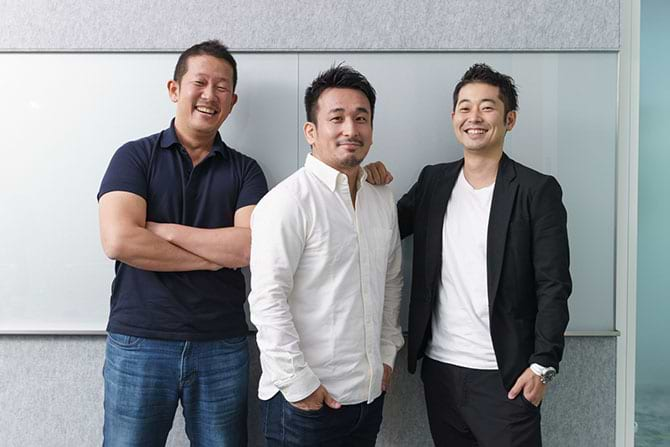
Sports Tech Tokyo is really about business development
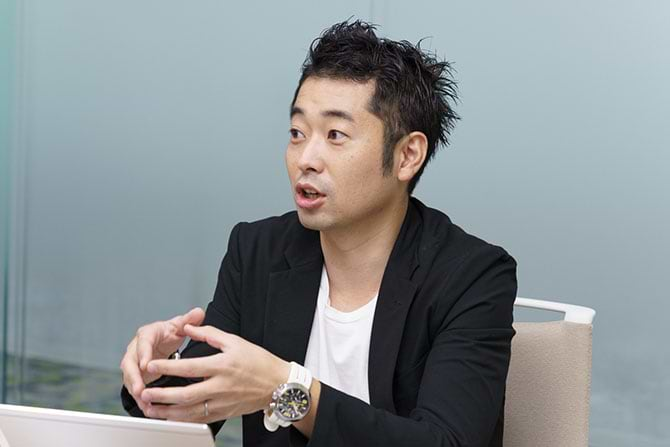
Programs for supporting business startups and matching events for investors have become popular around the world, and, among them, Sports Tech Tokyo stands out as a particularly exciting program. As the program’s organizer, Dentsu is demonstrating a strong commitment at every stage of the activities, from overseeing business development to networking, testing and verifying, and finally, commercialization.
As a transformation producer, Hiroaki Dehari supports Dentsu’s efforts to develop new businesses for client companies. He began by explaining the role of Dentsu’s members involved in Sports Tech Tokyo:
“Our job as organizers is to create new businesses. As I will explain later, it is very difficult for a single startup to commercialize and monetize its technology on its own. Therefore, we coordinate that process, which includes networking and negotiating with business partners. Concretely, while working together with the startup to verify the feasibility of its technology, we assess what sort of needs it can potentially contribute to in the sports industry, consider what kind of partners would be needed for realizing that, and conceptualize a business scheme.”
Shohei Koide works in the same role as a transformation producer. He described how the program is appealing because it brings together a lot of passion:
“In the future, new businesses will be created quite suddenly and unexpectedly from diverse circumstances. For us at Dentsu, instead of just waiting for requests from a client, we will need to work with various types of people from outside of our industry in order to make new businesses happen. A wide range of passionate people have become involved in Sports Tech Tokyo, from members of business startups and sports organizations to mass media and partner companies. That forms a more efficient venue for creating businesses.”
Yuta Yasutake, who has been involved in the program from the beginning, expressed his agreement, saying “Sports Tech Tokyo has created a community engulfed in business opportunities.” He expanded on this theme:
“Many partner companies, sport-related organizations, and sponsors (companies and organizations that support the program in various ways) are involved in Sports Tech Tokyo. The important point is that sport provides opportunities for everyone to play a part. The scope of sport is actually very wide, so partner companies can look forward to becoming involved in various different ways. For that reason, the level of enthusiasm among the community of partners that joined the program has been way beyond our expectations. Many companies, including some from France and other countries, have been asking about how the program is being carried out.”
Dehari agreed that the expansive scope of sport is a big reason for this interest in Sports Tech Tokyo, and added the following:
“When sport is a central theme, we can easily go a step further and try to tackle various issues that communities face today. What surprised me was that around 300 startups from at least 33 countries applied to the program. We could create opportunities to work with so many startups because of the appeal and attractiveness of sport. As mentioned earlier, businesses cannot be created unless we look beyond our industry in today’s world. Sports Tech Tokyo has become a venue for meeting people from a wide range of industries and places, and that is one of the things that make it so special.”
Just creating a community itself, however, is not the ultimate purpose of the program. All three producers agreed that the program provides a means for new business creation, and that Dentsu plays an important role in developing businesses together with startups and broadening such businesses beyond the boundaries of sport. Koide explained this process:
“We examine how a startup’s technology can be useful, and obtain and compile information that the startup’s members needs to know. Connecting them with that knowledge is important from the outset. In Dentsu’s business, projects typically end when advertising space is sold to a client, meaning deals are closed in the short term. By contrast, we are now doing the opposite of opening up business possibilities outside of our industry, and taking a long-term perspective so that startups, which can be very valuable for society, are not left behind.”
Dentsu’s contribution ahead of World Demo Day
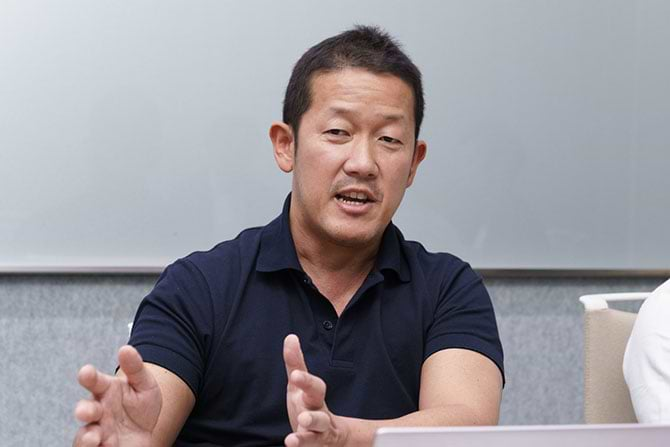
In August 2019, Sports Tech Tokyo held its World Demo Day in San Francisco to showcase the achievements of 12 finalists from the program’s many candidates. In preparation for the event, Dentsu’s three producers worked together with the startups to develop their businesses.
Commenting on their involvement, Yasutake noted, “First we assessed the startups’ technologies and, on that basis, redefined the added value of those technologies.”
For example, Omegawave, a startup from Finland, has created an athlete conditioning management tool, which it already provides to AFC Ajax, a professional football team based in Amsterdam. The tool is unique because it not only monitors physiological data like heart rate, but also brain activity, such as electroencephalographic data. Yasutake explained how it was assessed:
“After speaking with members of Omegawave, we defined its technology as a ‘communication tool’ because it creates opportunities for coaches and players to interact based on findings from the brain activity data, such as alcohol consumption and lack of sleep. Defining the tool that way opens up a broader range of possibilities beyond sports teams. Perhaps the tool could be used more widely in society. We carried out assessments of other startups in the same way.”

Using sport as a starting point, each startup pursued business development with an outlook for further possibilities. Dehari discussed the important aspect of such business development:
“We should consider what solutions can be provided through business development. The important thing is to help bring happiness to people and make society more affluent. If a startup just gives priority to profits and money, it is likely to seek any applications that appear feasible because it wants to use its technology, but a business cannot progress smoothly unless real solutions are fully considered.”
Yasutake agreed about the importance of starting from issues:
“There are many issues to tackle even within the realm of sport, but the startups in the program did not always recognize them. Even if a single startup is not able to provide a solution to an issue by itself, it should be able to if we introduce some partners to work with. For example, if a startup needs to create a media presence, we can introduce it to a media firm.”
What kinds of solutions are needed in the world of sport? Koide provided some examples:
“One issue is that most sports are not filmed or broadcast. This is largely the case for amateur and even pro sporting events, elementary and junior high school sports, and sports that involve individuals who venture into the mountains or out to sea. Nevertheless, people want to watch videos and broadcasts of such sporting events. A startup that works with unmanned video cameras and drones, for example, could meet those needs, but partners would inevitably be essential after considering where to broadcast and how to deliver the videos. A fan engagement system would also be important for generating excitement about the videos of sports that had not been available before. How to tap into that excitement and turn it into a business is another matter, so a business scheme would need to be created.”
Among the startups at the event, Pixellot, an Israeli company, provides AI-based automated camera systems for filming sporting events. Its products were originally intended to be used for professional sporting events, but, as Dehari pointed out, “If such systems are installed at school and municipal gymnasiums, it would be possible to create a long tail video business by selling videos of sporting events held at those locations.”
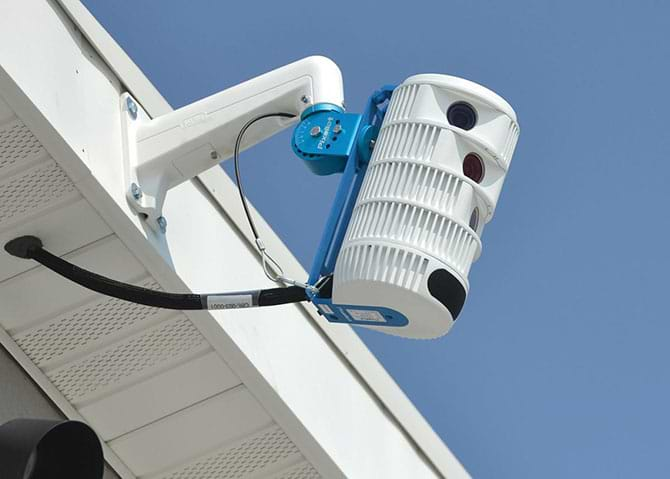
Originating in the United States, SportsCastr is an app that allows anyone to stream live commentary of a sporting event. This is especially useful for covering sports that are not locally distributed in other countries and not broadcast in other languages. For example, games of the J.League, Japan’s professional football league, are not broadcast in Thailand and Vietnam, even though a number of players from those countries have been performing well. According to Dehari, “I think that even if fans from Thailand, for instance, are interested in the games, there are barriers to watching them live.” He believes that if Thai football fans that follow the J.League were to provide live coverage as sportscasters, it could be possible to expand J.League broadcasts globally. He went on to say:
“It is expensive for platform providers to become multilingual, but SportsCastr solves that problem and, at the same time, provides a means for amateur sportscasters to personally develop and have a side job. By providing such solutions, a startup can completely change its value and appeal.”

Even among unique startups like those mentioned thus far, there are few cases of a single company being able to provide solutions on its own. Therefore, Dentsu can serve as a networking hub, as Koide explained:
“It is still rare for a competition like a triathlon, for example, to be broadcast on TV. If, however, there is a means for watching such an event live along with sportscasters who provide insightful commentary, fan engagement could be generated. That may be possible if we bring together a combination of services like SportsCastr and Pixellot.”
The kind of support program that startups have been hoping for
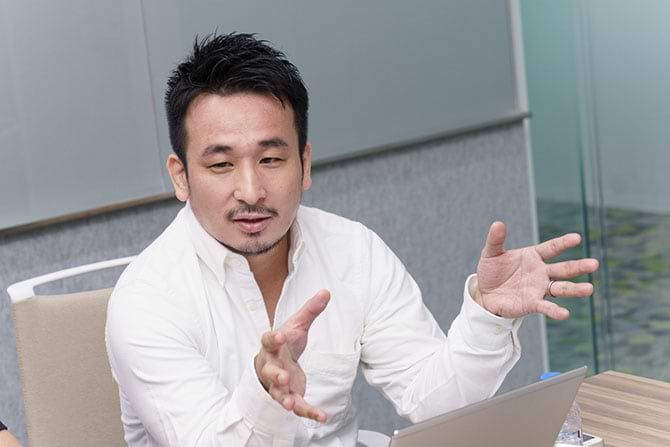
When a startup support program has a limited time frame, it is not easy to narrow down possibilities to the point of envisioning an actual business. Nevertheless, Dentsu’s members got used to such constraints, as Koide explained:
“Firstly, we confirmed the feasibility of actually applying the technologies, and assessed whether the practical application of each one for teams and athletes would be genuinely useful for providing solutions and eventually make people happy. That plan-do-check-act cycle had to be carried out swiftly. Getting things done quickly is important for startups, and delays of only a few months could actually lead to the end of the company. Therefore, we determined what teams and athletes should be subject to each proof of concept and whose cooperation should be secured. We had to make proposals on the spot and create favorable conditions, but, frankly speaking, a great deal of effort was required.”
Yasutake added the following:
“Business development for the program’s startups had to be carried out within a limited amount of time. Conventionally, Dentsu’s business has been based on a client orientation approach, but in this case, we had to identify the solutions to pursue ourselves. What I learned during that process is that you must have guts and act decisively. A plan can be devised in a day, but it will turn out differently after you work on it for a while. I rediscovered that every day.”
According to Dehari, “We had to start from scratch to do the business development.” Once ideas began to take shape from that, they brought in many more members from Dentsu to help grow the startups’ businesses. Dehari expanded on this process of business development for Sports Tech Tokyo:
“Dentsu is very capable of developing a proposal once it is conceptualized. On the other hand, as opportunities to start from scratch are still very rare, the path to success was not obvious at all. We had to start from a blank page and find a way to make progress. Through that process of Sports Tech Tokyo, I learned things that I can apply in my work outside of the program.”
World Demo Day was held in August 2019 at Oracle Park, the home of the San Francisco Giants professional baseball team. The widely publicized event was attended by representatives from various sports leagues and associations along with investors and journalists. Dehari commented on the event:
“World Demo Day attracted a really large number of people, and Dentsu’s contribution in that regard alone was very impressive. World Demo Day continued to have a significant impact after it was held, and we received enquiries via social media from companies and investors that are interested in participating if the event is held again next year.”
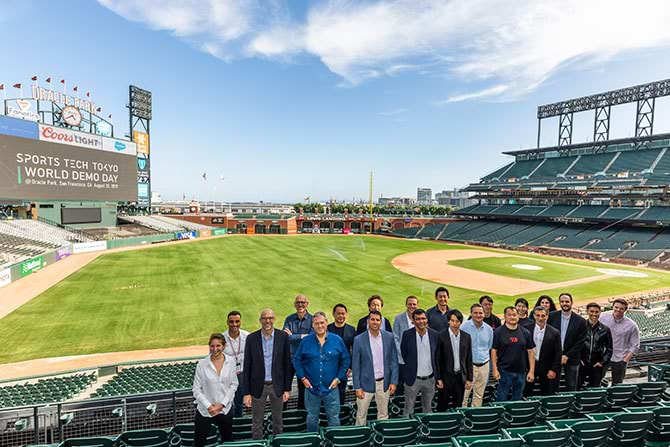

In the days leading up to World Demo Day, however, the three producers were under a great deal of pressure, as Koike described:
“We had an excellent kickoff event last year in April, but that raised everyone’s expectations. Whether we could attract people to World Demo Day or not depended on what we would do after the kickoff event. Regardless of how many people were at the kickoff, if few people attended World Demo Day, it would be a big failure. In the end, however, many people attended. I think such a large number indicated that the participants were facing challenges that they could not overcome on their own, and they expected Sports Tech Tokyo to be helpful in that regard. The most gratifying thing about World Demo Day was that the 12 finalists in particular were really happy. Besides the finalists, other participants told us that Sports Tech Tokyo was exactly the kind of program that startups had been hoping for.”
What kind of program do startups really want? Startups not only want to be introduced to investors, but also receive support for jointly developing and transforming their businesses so that their technologies can be utilized in settings that really need them. Yasutake summed up Dentsu’s contribution:
“Leveraging Dentsu’s network, we integrated our unique perspective on challenges faced by companies and communities with the value that the startups can offer to pave the way for new businesses. That is something only Dentsu can achieve, and I think there will be possibilities to create a diverse range of businesses in the future in areas beyond the initial boundaries of Sports Tech Tokyo.”
Through the Sports Tech Tokyo program, business models are being created from the starting point of sport and further developed into other industries and solutions for various communities. Through such efforts, many new projects and initiatives can be expected in the future.
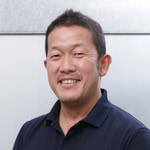
Shohei Koide
Transformation Producer
Business Transformation Division
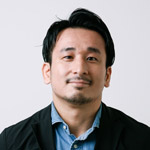
Yuta Yasutake
Transformation Producer
Business Transformation Division

Hiroaki Dehari
Transformation Producer
Business Transformation Division
